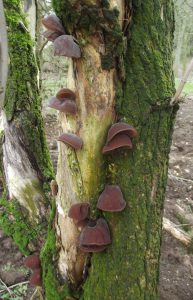Email: geoff@geoffdann.co.uk
16/03/2018
There’s a lot of Jew’s Ears (Auricularia auricula-judae) around at the moment – it is one of the few edible wild fungi that can be found right through the year, and it is typically abundant throughout the winter. And that means there’s a lot of something else around at the moment: arguments on the internet about the acceptability of its name, some of which escalate into extremely bad-tempered personalised battles. The truth, as usual, tends to get lost in the crossfire.
This battle, in its modern British form, originates with a decision first by Plant Life International in 2003, and then by the British Mycological Society (the “BMS”) in 2005, to give it a new official name of “Jelly Ear”. In recent years the BMS has embarked on a project to designate official English common names for fungi, with the stated goals of making fungi more accessible (and fun) to non-scientists (by reducing the need to use cumbersome Latin names) as well as avoiding confusion where a species has more than one common name, or a common name refers to more than one species. All well and good, but this example doesn’t fit into either of those categories: “Jew’s Ear” (or names it is derived from) has long been the recognised common name for this species (it is the oldest English common name for any fungus), and it only refers to this species. This is the sole case where a decision was made to replace an established common name with a newly invented one, and the motivation was political. While the BMS has no legitimate authority to impose political judgements on the English-speaking world, it nevertheless had to make a decision as to what the “official” common name of this species was to be, and since accusations of anti-semitism were already rife on the other side of the Atlantic, the BMS played it safe and adopted a new name. I think this was the wrong call, and this post explains why.
Why is this name considered, by some, to be “anti-semitic”? Usually no justification is given – people condemning the name seem to just expect everybody else to assume it is self-evidently anti-semitic. But plenty of species have similar common names that aren’t considered derogatory. Are we going to reject the names “Lady’s Slipper” (Cypripedium reginae) or “Lady’s Smock” (Cardamine pratensis) for being sexist? Are “Monk’s Rhubarb” (Rumex spp.) or Star-of-Bethlehem (Ornithogalum angustifolium) anti-Christian? What about Hottentot Fig (Carpobrotus edulis)? This is an edible plant native to south Africa, but well established in Europe. “Hottentot” is an old Dutch name for a southern African tribal people now more correctly known as “Khoekhoe”, and the etymology suggests “stutterer”, or just an approximation of what Khoekhoe language sounds like to dismissive European ears. As such, it is polite today to refer to these people by the name they use for themselves and “Hottentot” is considered mildly derogatory, but I’m yet to hear anybody suggest we rename Carpobrotus edulis something boring and inoffensive like “Succulent-leaved Fig”. But “Jew’s Ear” doesn’t even reach this level of offensiveness – what is actually offensive or discriminatory about “Jew’s Ear”?
One theory that’s been postulated during these online battles is that the Nazis issued anti-semitic propaganda posters depicting Jews as “ugly” – with over-sized ears and noses. This may well be true, but since the name of the fungus predates the Third Reich by several centuries, the claim of a causal connection with Nazi propaganda doesn’t make sense. The accusation of anti-semitism also predates the Nazis, the first example anyone can find coming from American mycologist Curtis Gates Lloyd (1859-1926). But Lloyd’s main claim to fame was his eccentric opinions on fungal naming conventions (in both Latin and English), and I can find no account of his justification for rejecting this one – just another claim that it is a self-evident “slander on the Jews”. He also disliked the Latin version (which means exactly the same thing) for being too long and including a convention-busting hyphen.
And it is in America that the modern rejection of the name on spurious grounds began. Here, for example, is an article that appeared in the summer 2005 edition of the Long Island Mycological Club’s newsletter. It contains several pages of hysterical wailing about the anti-semitic nature of the name “Jew’s Ear”, but is notably lacking in supporting evidence. First it claims that “Nazi hate literature” published in 1938 made some connection between this fungus and anti-semitism, but beyond the wild, vague accusations, there is neither any detail nor any link or reference to the material in question. And anyway, since the article itself acknowledges that the name predates the Nazis by several centuries, why does anything they wrote about it matter? The author then goes on to claim that “the most likely origin of the name is the hysterical anti-semitism that burgeoned in the middle-ages…” No actual reason is given for why it is “most likely”. The most interesting thing about this article is the way it portrays America, with its powerful Jewish lobby, as blazing the way forwards on this matter (even changing the Latin name to Auricularia auricula) while the UK and the rest of the “old world” are still backwardly wallowing in the middle ages. Thus it seems the BMS decision was influenced by a culture of anti-anti-semitic witch-hunting in the United States.
The origin of this name is not a mystery, and does not appear to have much to do with anti-semitism or Judaism. The name was originally “Judas’s Ear”. The Latin specific epithet “auricula-judae” means “Judas’s Ear”. This name was derived from a Christian myth that Judas Iscariot hung himself from an Elder tree, and because Jew’s Ears particularly like to grow on Elder, it was said that Judas’s spirit passed into the tree, and thus these fungi are somehow his ears.
From the American article: “Why, then, is this fungus also known as “Jew’s Ear”? How and when did “Judas’s Ear” become “Jew’s Ear”? Or did these variant names exist together all along simply because Judas was associated with the Jews?”
The answer is simple: it is a contraction. – “Judas’s Ear” became “Judas Ear” or “Jude’s Ear”, which was eventually shortened to “Jew’s Ear”. No anti-semitism – just the English language evolving to leave a consonant out here or there. The fact that the author of the article is absolutely convinced that this must have been the deliberate work of people who hated Jews is of no relevance.
The article continues: “We will probably never know the precise answers to these questions…” and “. I believe there was no mistranslation…” Lots of “probably”, “we don’t know” and “I believe.” But no evidence.
The Elder mythology is itself something of a curiosity. An older traditional claim is that Judas hung himself on a Mediterranean Redbud tree (Cercis silquastrum). And anyone familiar with Elder must surely agree that it is a strange choice of tree to hang yourself from: it’s just not robust enough, and you’d expect the branches to break. Although Elder does occur in the Levant, there is no historical record of an association with Christianity until that religion started to exert its authority in Europe, and this is where we need to look to discover the true origin of these myths.
Two Christian myths appeared in medieval times regarding Elder. One was that Elder wood was used to make the cross Jesus was crucified on (again, a very strange choice from a practical point of view), and the other was this story about Judas hanging himself. Both myths associate Elder with bad things. But there was already a rich Pagan mythology surrounding Elder in which it was associated with feminine spirituality (see here and here). All across northern Europe, Elder was associated with Goddesses or “the Elder Mother”. The spirits of dead witches were said to inhabit Elder, and for these reasons the wood should only be burned with great caution and reverence. If you delve into the mythology and history of this era, the true origins of the Christian Elder mythology become clear: this was an attempt by the Catholic Church to displace Pagan beliefs that were profoundly incompatible with Christian theology with Christian mythology aimed at demonising the revered Elder tree and exorcising its feminine spirituality. And it largely worked.
So the truth is that there is no reason to believe that name “Jew’s Ear” is even remotely anti-semitic. If anything, it is anti-pagan. And in fact you’ll find that most Jews themselves don’t find the name offensive. Like so much political correctness, more people seem to be vicariously offended on behalf of other people, than people being offended themselves.
I am going to make a political statement myself: political correctness has become the scourge of modern western culture and is an obstacle to free thinking, free speech and the pursuit of truth. I am very much hoping that the election to the highest political office in the world of a person who pays no heed whatsoever to political correctness will be seen as a turning point. Perhaps, at long last, we have passed “Peak Political Correctness”. Another sign of this cultural change is the meteoric rise to fame of Canadian academic Jordan Peterson, whose interviews and youtube videos are inspiring a whole generation of younger people to abandon political correctness wholesale. The trigger for that rise to fame, along with the publication of his second book, was to point blank refuse to accept that the Canadian government had any right to compel him to use gender-neutral pronouns to when referring to transgender people: he viewed it as an assault on his freedom of expression, just as is the attempt to compel people to abandon the traditional name of A. auricula-judae.
 Apart from anything else, the attempt to change the name of this fungus has failed. It was a case, perhaps, of it being better to let sleeping dogs lie. By attempting to impose a political directive, via language policing, the people who made this decision, rather than putting this issue to bed, have ensured that every time anybody uses either common name, this whole argument will re-ignite. And I am willing to bet that the traditional name will survive into the 22nd century and beyond, and the name “Jelly Ear” will forever be associated with a period in the late 20th and early 21st centuries when political correctness was allowed to steamroller the truth.
Apart from anything else, the attempt to change the name of this fungus has failed. It was a case, perhaps, of it being better to let sleeping dogs lie. By attempting to impose a political directive, via language policing, the people who made this decision, rather than putting this issue to bed, have ensured that every time anybody uses either common name, this whole argument will re-ignite. And I am willing to bet that the traditional name will survive into the 22nd century and beyond, and the name “Jelly Ear” will forever be associated with a period in the late 20th and early 21st centuries when political correctness was allowed to steamroller the truth.
Perhaps a compromise is available though. If “Jew’s Ear” is a contraction of “Judas’ Ear”, maybe we can make crystal clear that the name isn’t anti-semitic by reverting to the original, unshortened version, rather than imposing the bland, empty, boring, sanitised “Jelly Ear”.




The name Hottentot Fig is also unseemly.
Thanks for not buckling to political correctness. I agree there is no intent nor reality of anti-semitism in this name, and its etymology just makes it more interesting.
If you know that people are offended by it, why is it so difficult for you to stop using it? Are you unable to learn new information? Do you really think that your opinions are more important than others’, regardless of the origin of the name?
You acknowledge that “Hottentot” is offensive, yet you think that because no one has officially recognized a different name that this somehow justifies it? That is not “free thinking”, this is faulty and short sighted logic, to the point of being laughable.
Any good common name should be reflective of some aspect of the species. This one is not. “Wood ear” is. It’s a pretty simple concept, so I’m not sure why it’s so difficult for you to grasp.
You have the right to free speech in most countries, and people have the right to free speech to point out the faultiness of your logic.
Hi Crystal
I haven’t acknowledged that the name “Hottentot Fig” is offensive. The word “hottentot” is offensive, but in this case it is referring to a plant, not people. I would resist anybody trying to change the name of this plant too.
>>Any good common name should be reflective of some aspect of the species.
Why? I think common names which merely describe the species are boring. I much prefer unusual names, especially ones with long histories or interesting etymologies. If we replaced all the unusual and curious names with functional ones, the world would become a poorer place. It’s cultural vandalism.
> this is faulty and short sighted logic,
I don’t believe this has anything to do with logic. This is about cultural history.
>If you know that people are offended by it, why is it so difficult for you to stop using it?
I hate political correctness, and I hate language policing by the purveyors of political correctness. I also do not believe that anybody has a right to not be offended, especially if the thing they are taken offence at is irrational. This idea that people have a right not to be offended is a blight on modern western society. Perhaps people should be less easily offended?
This clip of Cathy Newman interviewing Jordan Peterson sums it up perfectly (also about language policing). Why should the entire English speaking world change the oldest common name of any fungus in the English language because a group of people have decided to offence at it based on a faulty understanding of the history and meaning of the name?
> Do you really think that your opinions are more important than others’, regardless of the origin of the name?
Why do you think yours are? It isn’t me who is trying to change the name of this fungus.
I will also plainly say that there’s another element to this particular dispute, specific to false accusations of anti-semitism. I don’t know if you are British, but anybody who follows British politics will be aware that for the last few years there has been a vicious and systematic smear campaign conducted against the now ex leader of the Labour Party. Various parties, some of them on the right of British politics, but also many right wing people in the United States and Israel, systematically interfered with British politics in order to make sure Jeremy Corbyn never got anywhere near power. And they used fake accusations of anti-semitism to do it. 90% of what they were calling “anti-semitism” was nothing of the sort. It was actually legitimate criticism of the ongoing crimes against the Palestinian people committed by the criminal, racist state of Israel. It was done precisely because Corbyn, unlike most politicians, was willing to stand up and speak the truth about the crimes being committed by the Israeli state. Because of this, I am not minded to dance to any tune being played by the Jewish lobby in America, and it is from there that the demand to change this name originated. I cannot stop Israel from persecuting the Palestinians, but I can damned well refuse to let the same bunch of people force me to change a centuries-old common name of a fungus based on an incorrect account of its meaning and history. In short, I am sick to the back teeth of fake accusations of anti-semitism. Enough already.
The sadly amusing thing about those accepting the anti Jew’s ear (as a common name) propoganda and getting all hot under the collar, when anyone uses it, is that I have spoken with friends who are Jews, regarding this subject (yes, I do have friends!). Guess what? Whilst my survey of friends is not exactly a conclusive one, I have found not one case of offense taken, at the old (still widely recognised and commonly used) common name.
The current common name, as picked by the British Mycological Society, doesn’t sit as well as wood ear. Maybe we could improve on that, calling it: wobbly brown wood ear (though, to be fair, it only wobbles when prodded, poked or waved about- I have never seen it wobble of its own accord)? I believe that trifles and all other (potentially) wobbly and gelatin related desserts and sweets might be quite offended by their name being abused and applied to a fungus that grows on wood, which doesn’t look like any jelly I’ve ever seen and would (very probably, for the majority of folks) be a most unwelcome find, in a bag of jelly babies (are we still allowed to call them jelly babies?). So let’s change that one, right now!?
Whatever you choose to call it, Auricularia auricula-judas is a fine edible, which I enjoy immensely.
I refuse to let the word police leave a bad taste, with all their faulty logic …
… I don’t agree with the “Let’s be offended on behalf of someone else, who isn’t offended” brigade, therefore, declare: their logic is faulty!
ps. I blame the Christians
I find the comments on why the name is not anti Semitic to be a very poor argument. As for the “not bowing to political correctness” brigade absurd that in the 21st century we cannot adapt and move on. It seems that many people feel such things are a non issue until something bothers them
Thank you for publishing this article. I am just learning about Fungi (at the very beginning of my journey) and used the name Jews Ear in a Facebook group, to which I was immediately banned and received a torrent of abusive messages. I used the term in innocence as it is used in a number of ID books that I have. I am quite shocked at this reaction and think political correctness has gone totally mad. It’s quite ironic really, as on my fathers side, I even had a grandparent who was Jewish. But at the same time I am called racist and all sorts of silly words.
I want to learn about plants, fungi and the natural world, yet I am pulled into some political nonsense. I long became disinterested in politics and despise many aspects of the left and the right. But it seems it’s impossible to escape the thought police.
Hi David
Which Facebook group was it? Some of them are seriously unpleasant, as a general rule.
(See: https://www.geoffdann.co.uk/in-response-to-the-three-year-campaign-of-hate-lies-and-bullying-by-kerry-woodfield-and-diane-cavallero/)
Geoff
er…anti-Semitism also predates the Third Reich by several centuries!
Yes. So? The point I made was in response to the claim that Nazi hate literature said there is a link between the name “Jew’s Ear” and anti-semitism. Why should we trust Nazi hate literature as an authoritative source on this topic? Would we trust it as an authoritative source on anything else? Nazi hate literature is about as untrustworthy a source as I can think of, especially if the information in question involves Jews or anti-semitism.
Sorry, but you are way off on this. There are many names and nicknames for plants; can’t we pick the ones that don’t evoke images of a racist historical past? As a K-8 teacher, I notice that my students are shocked when they hear and see terms like these because they are being encouraged to show kindness, not be a bully, not participate in name-calling, etc. They’re not accustomed to just accepting “the way things have always been”. Over time the way we interact with people of other cultures change and humans get smarter (hopefully, though this post proves that some are too stubborn). Instead of being stubborn, use it as a learning experience.
In what way do you think this is bullying and name-calling, given the actual etymology? The “evocation of a racist historical past” in the eye of beholder. It’s not there in the actual name. You do not appear to distinguish between these things, but I believe they do matter. Racism is a very real problem, but so is seeing racism (and anti-semitism) everywhere, even where it isn’t.
I personally like the name Wood Ear. It grows in the woods and it is shaped like an ear. In Spanish the name for green beans is judías literally meaning Jews. Now some people want to rename it alubias.
Wood Ear and alubias is something I would buy. However, I wouldn’t buy Jewish anything because it ruins my appetite. I don’t enter personal relationships with Jews (I respect theirs and everyones civil rights) but I don’t form friendships, life partnerships or house shares with them. It’s a trust thing.